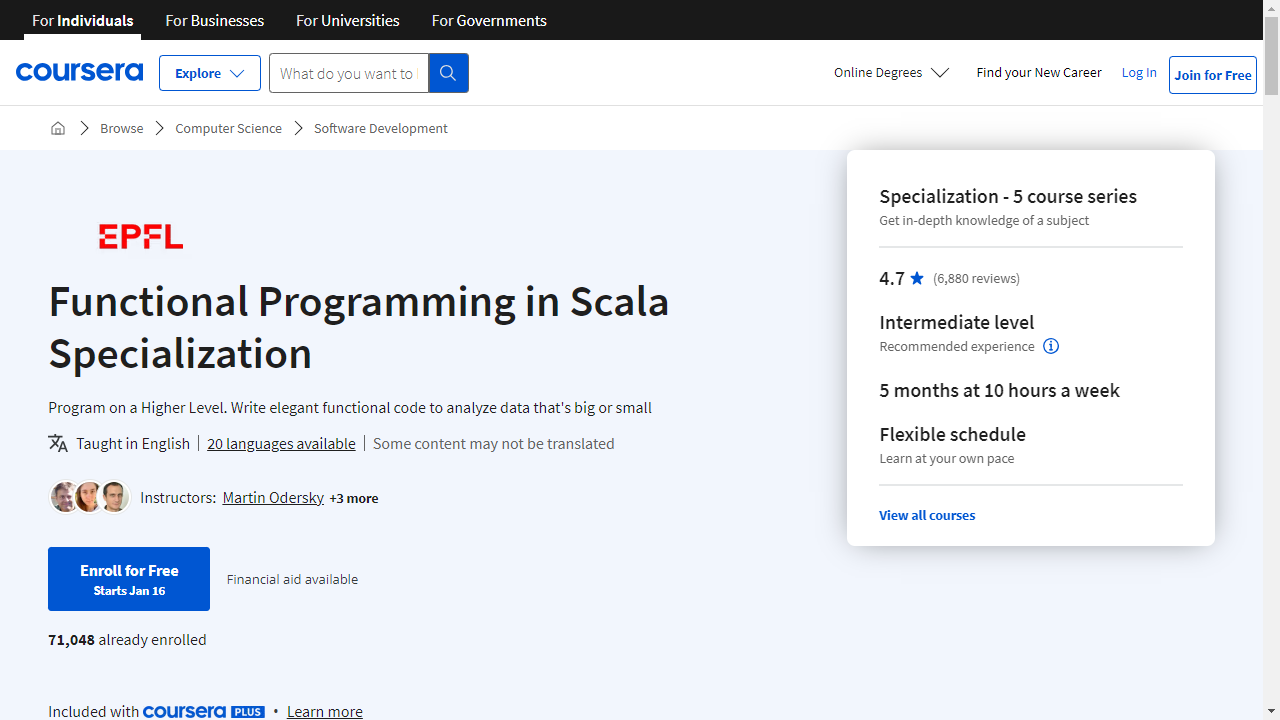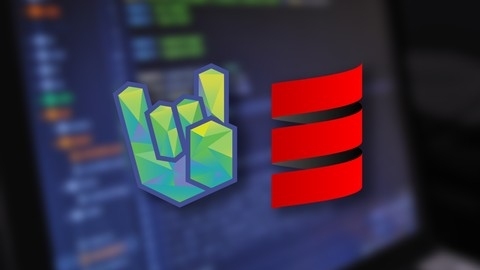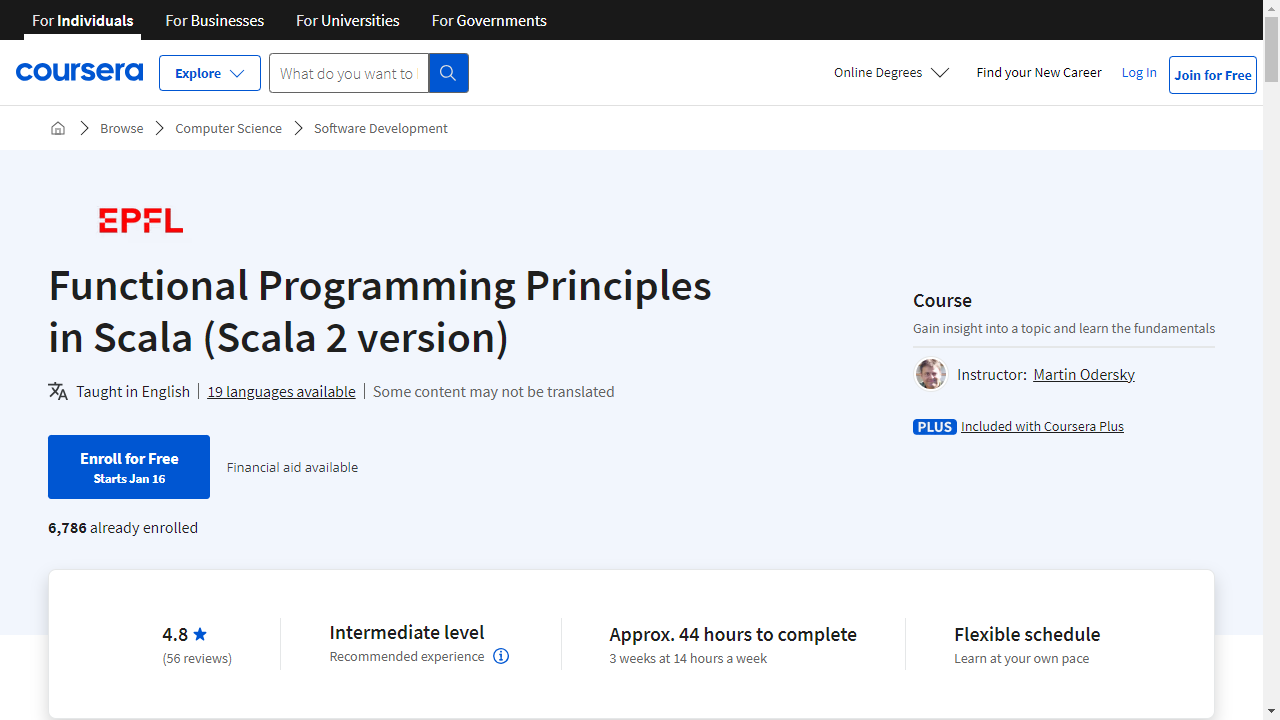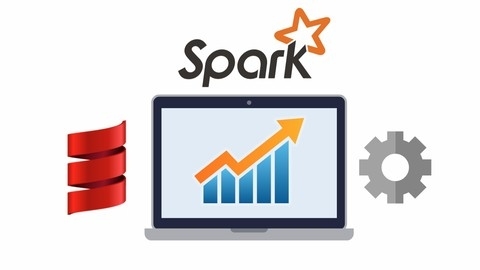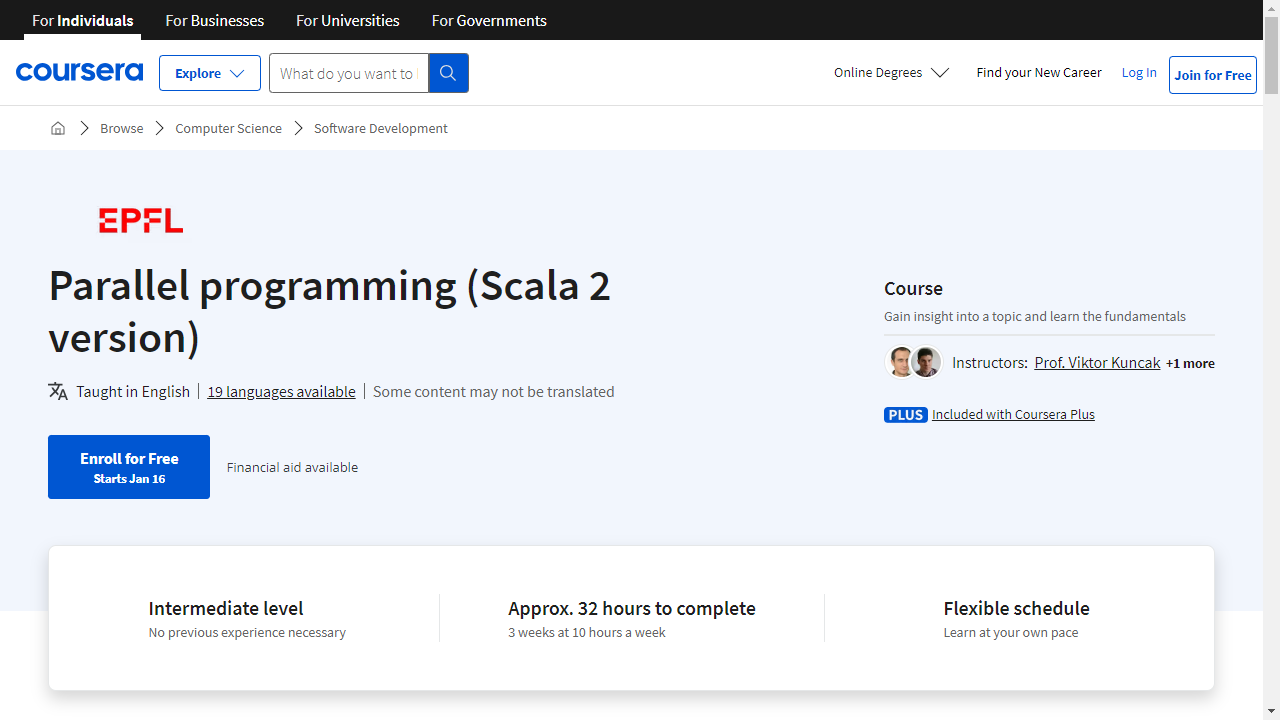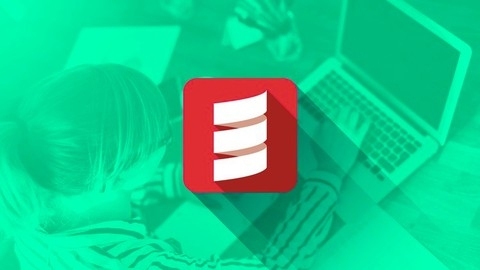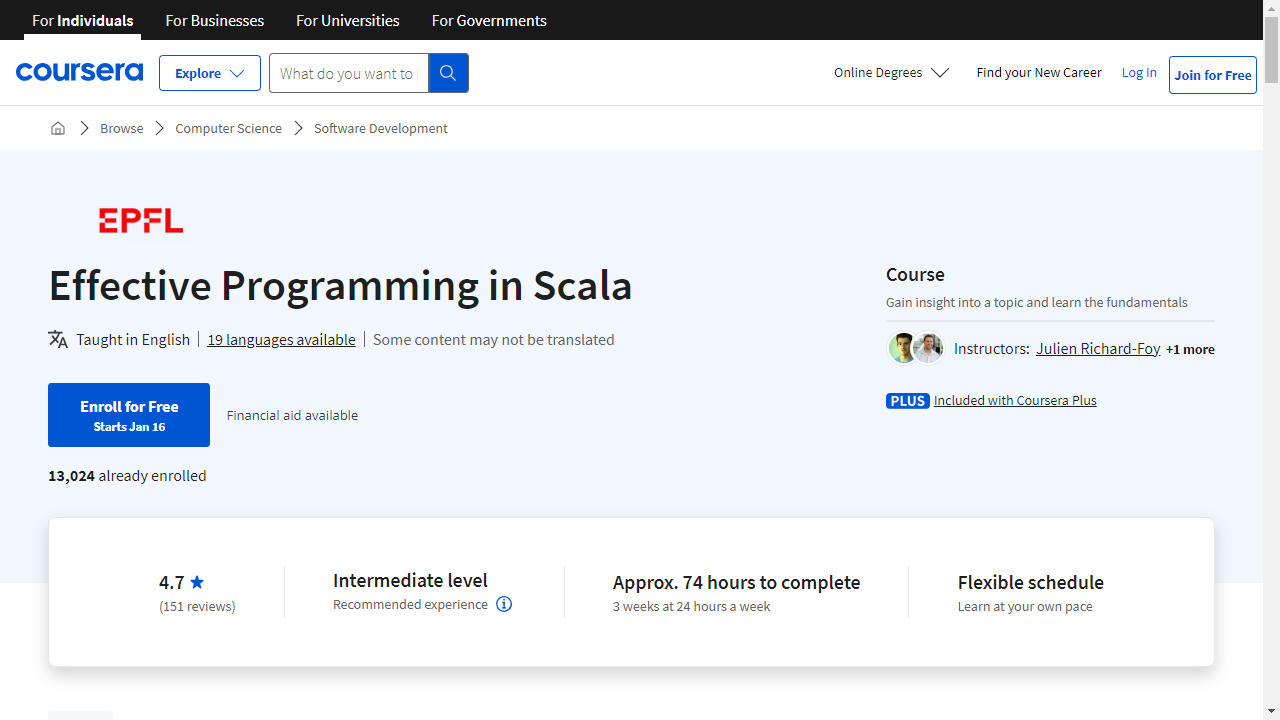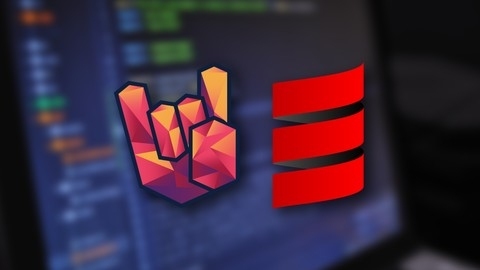Scala is a powerful programming language that seamlessly blends object-oriented and functional programming paradigms.
Its versatility makes it a popular choice for building a wide range of applications, from web services and big data systems to machine learning and distributed computing.
By learning Scala, you can enhance your programming skills, expand your career opportunities, and tackle complex software challenges with elegance and efficiency.
However, finding a comprehensive and well-structured Scala course that caters to your learning style can be challenging.
You want a course that not only covers the fundamentals but also delves into advanced concepts, provides hands-on practice, and equips you with the skills necessary to build real-world applications.
For the best Scala programming course overall, we recommend the Functional Programming in Scala Specialization on Coursera.
This specialization, offered by École Polytechnique Fédérale de Lausanne (EPFL), provides a deep dive into functional programming principles using Scala.
It covers core concepts like recursion, higher-order functions, immutable data structures, and parallel programming, culminating in a capstone project where you build a data-intensive application.
While the Functional Programming in Scala Specialization is our top pick, there are other excellent Scala courses available that cater to different learning preferences and goals.
Whether you’re a beginner or an experienced programmer, there’s a course out there that can help you master Scala and unlock its full potential.
Keep reading to discover our curated list of recommendations.
Functional Programming in Scala Specialization
Provider: Coursera
This specialization guides you from the fundamentals of functional programming to building real-world applications.
You’ll start by learning core concepts like recursion, higher-order functions, and immutable data types.
You will use these principles to write efficient programs in Scala.
As you progress, you’ll explore functional program design, learning how to apply these principles to larger applications.
You’ll encounter concepts like lazy evaluation, monads, and design patterns that help you build robust and scalable applications.
The specialization then delves into parallel programming, a crucial skill in our multi-core world.
You’ll discover how to write efficient parallel code using data parallelism and explore Scala’s data parallel collections.
You’ll then learn how to apply functional programming to big data analysis using Apache Spark.
You’ll discover how to process large datasets, analyze data efficiently, and design algorithms for distributed environments.
Finally, you’ll put your knowledge into practice with a capstone project.
You’ll build a data-intensive application using real-world data, working with tools like Apache Spark and SQL to process massive datasets and create interactive visualizations.
Scala & Functional Programming Essentials | Rock the JVM
Provider: Udemy
This Scala course begins with the basics.
You’ll learn how to structure your code, work with values, variables, and understand how Scala’s type inference system can help you write cleaner code.
You’ll also dive into functions, expressions, and even explore concepts like recursion.
Next, you’ll explore object-oriented programming (OOP) in Scala.
You’ll learn OOP basics like methods, classes, inheritance, objects, traits, and anonymous classes.
You’ll even get hands-on experience implementing your own collection through exercises.
You’ll then dive into the world of functional programming, learning about higher-order functions, currying, and essential techniques like map, flatMap, and filter.
You’ll develop a deep understanding of how these concepts work with collections like Lists, Arrays, Vectors, Tuples, and Maps.
You’ll also discover how to handle potential errors using the Option type, ensuring your code is robust.
Finally, you’ll explore pattern matching in detail, learning different techniques to analyze and manipulate data structures, including Scala 3’s braceless syntax.
You’ll walk away from this course knowing how to write elegant and concise code using pattern matching in various scenarios.
Functional Programming Principles in Scala (Scala 2 version)
Provider: Coursera
This Scala programming course teaches you how to write code using clever techniques like recursion and higher-order functions.
You start by setting up the tools you need on your computer, whether you use Linux, Mac, or Windows.
The course then introduces you to the world of functional programming, where you’ll discover new ways to solve problems using code.
You then dive into the heart of Scala, learning about its unique features like higher-order functions and currying, which let you write flexible and efficient code.
You’ll work with data structures like lists and sets, mastering techniques to manipulate and analyze them using functional programming.
You even get to write code for real-world applications like the Huffman coding algorithm, which is used to shrink the size of data.
As you progress, you’ll discover how to combine functional programming with object-oriented concepts, learning about classes, objects, and a powerful technique called pattern matching.
You’ll become comfortable with Scala’s collection library, a powerful toolbox for storing and organizing data.
Scala and Spark for Big Data and Machine Learning
Provider: Udemy
This course guides you through learning Scala and Spark, important tools for handling large datasets and machine learning.
You’ll begin by setting up your development environment, installing Scala and Spark on Windows, Mac OS, or Linux (Ubuntu).
The course then guides you from the basics of Scala programming, like variables and data types, to advanced concepts like Spark DataFrames.
You’ll become skilled in working with data structures like lists, arrays, and maps, and control flow mechanisms like loops.
Once you’ve mastered Scala, you’ll learn to use Spark DataFrames to perform operations on large datasets, like grouping data and handling missing values.
The course then introduces machine learning with Spark, teaching you algorithms like linear regression, logistic regression, and KMeans clustering.
You’ll learn how to evaluate the performance of your models and use techniques like Principal Component Analysis (PCA).
The course will help you develop the skills to build prediction models and analyze data for patterns.
Finally, you’ll explore DataBricks, a cloud platform for Spark, and learn to build recommendation systems.
The course will even guide you in setting up your own Spark cluster on Amazon Web Services (AWS) using Zeppelin notebooks.
Parallel programming (Scala 2 version)
Provider: Coursera
This course on parallel programming using Scala teaches you how to write programs that can run on multiple processors at the same time.
You begin by learning about the JVM and how to use its power for parallel computing.
You quickly dive into practical exercises, learning how to use tools like IntelliJ IDEA and Sbt to write and run your Scala code.
The course then introduces you to the Monte Carlo method, a technique used to estimate values like Pi.
You discover how to write parallel sorting algorithms, an essential skill for handling large datasets.
You explore data-parallel operations, which allow you to manipulate large amounts of data efficiently.
You learn about mapping, folding, and prefix sums, important tools for parallel programming.
As you progress, you’ll dive into advanced topics like parallel collections in Scala and the implementation of sophisticated data structures like Conc-trees.
You learn about K-Means, a method for grouping data points, and the Barnes-Hut simulation, a technique for simulating gravitational forces between objects.
These practical examples show you how to use the concepts you’ve learned to solve real-world problems.
Scala Applied, Part 1
Provider: Udemy
This Scala course begins with the fundamentals, guiding you through the setup of your coding environment.
You will learn to use the Scala REPL for interactive coding and SBT for managing Scala projects.
The course then dives into the basics of Scala, covering variables, data types, method definitions, control structures like if expressions and loops, and how to write Scala scripts.
You will then transition into more advanced concepts, exploring Scala worksheets in IntelliJ for interactive coding and learning about method parameters, return types, expressions, statements, and tuples.
The course delves into Scala collections like lists, sequences, sets, and maps.
You will understand the difference between mutable and immutable collections and learn to use extension methods.
Next, you’ll explore object-oriented programming in Scala.
You will define classes and objects, work with constructors, parameters, fields, and learn about companion objects and the concept of privacy in Scala.
The course covers important concepts like preconditions, auxiliary constructors, implicit conversions, and method overloading.
The course then moves into the world of control structures in Scala.
You will learn about for expressions, pattern matching using match expressions, and how to use guards for precise decision-making in your code.
You’ll also discover how to interpolate strings for creating dynamic text.
Finally, you’ll explore functions and closures, including nested methods, function literals, higher-order functions, partial application, and closures, enabling you to write reusable and adaptable code.
You will learn to create custom control structures with higher-order functions, a powerful technique for writing concise and reusable code.
The course covers the loan pattern for managing resources, currying for breaking down functions, and function arity for understanding the number of parameters a function takes.
You’ll also dive into parameterless and by-name functions, adding flexibility to your code.
Effective Programming in Scala
Provider: Coursera
This course takes you deep into Scala programming, turning you into a skilled developer.
You start with the basics: types, methods, parameters, and conditions—the building blocks of strong applications.
You then tackle domain modeling, learning to represent real-world ideas in your code using techniques like case classes and sealed traits.
You’ll discover how to write the efficient business logic behind complex applications.
The course then explores collections, a key part of any programming language.
You’ll learn to manipulate and use collections effectively, mastering techniques like sequences and maps.
You’ll explore loops, recursion, and the “for” syntax, gaining different ways to solve problems and make your code even more powerful.
As you progress, you’ll meet sbt, the Scala build tool, learning to organize your code and build your applications—essential skills for large projects.
You’ll also learn about encapsulation and extension methods, enabling you to create modular, reusable code.
The course then dives into testing and debugging.
You learn to write effective unit tests and integration tests, ensuring your code works as expected, using techniques like mocking to test complex interactions.
Finally, the course tackles advanced concepts like type classes and concurrent programming.
You’ll gain a deeper understanding of Scala’s type system and learn to build applications that efficiently handle multiple tasks using the Future type.
You’ll finish the course with a strong understanding of Scala programming, ready to build complex, reliable applications.
You’ll be comfortable using Scala’s powerful features, including collections and concurrent programming.
You’ll also have the skills to test and debug your code, ensuring its quality.
Advanced Scala and Functional Programming | Rock the JVM
Provider: Udemy
This course takes you deep into advanced Scala and functional programming.
You’ll start by refreshing your knowledge of basic Scala, including pattern matching and syntax sugar.
From there, you’ll dive into advanced functional programming concepts, exploring tools like partial functions and functional collections.
You’ll learn how to create powerful functional sets, master lazy evaluation with infinite streams, and become comfortable working with monads.
The course then shifts to concurrent programming on the JVM.
You’ll learn how to write code that can handle many tasks at once, making your applications faster and more efficient.
This includes understanding how threads communicate, how to manage asynchronous operations with Futures and Promises, and the challenges of writing code for multi-threaded environments.
You’ll then unlock the power of implicits and type classes.
These concepts will help you write more reusable and maintainable code, allowing you to build complex applications with ease.
You’ll also get a taste of Scala 3, exploring features like given instances, using clauses, and extension methods.
Finally, the course guides you through mastering the Scala type system.
This includes understanding advanced inheritance, variance, type members, and higher-kinded types.
Also check our posts on:
